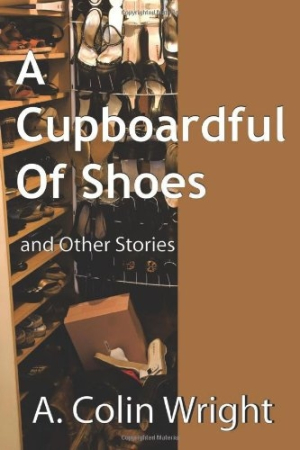A Cupboardful of Shoes and Other Stories
“Well begun is half done,” according to Aristotle. In the case of A Cupboardful of Shoes and Other Stories, A. Colin Wright begins well, with his first six stories hitting high notes, but only about half of the book is well done.
Wright’s collection would have benefited from more sharply applied curatorial decisions. He’s clearly in possession of a far-reaching and eclectic imagination, but some of his stories would have been better left for inclusion in another collection.
His opening story, which bears the collection’s title, is agile and engaging; narrated in the first-person female voice, it centers on stilted family dynamics and old secrets. Next, in “Queen’s Grill,” the author nimbly shifts to a first-person male narrator, whose dust-up with a remote movie star raises as many questions as it answers.
One of Wright’s best stories is “A Pregnant Woman with Parcels at Brock and Bagot.” It asks the reader to consider and reconsider possibility, fate, coincidence, and how lives can intertwine or slide silently past one another based on a simple, split-second maneuver on a sidewalk. Told in third person, Wright’s unfolding narrative includes flashbacks and imagined scenarios that tease and invite the reader along. The story is quick, but also languorous—an indication of the writer’s skill.
There are several other solid, appealing, and competently written stories in the collection, featuring characters as diverse as a womanizing preacher, a polyamorous truck driver, a guilt-ridden member of the Gestapo, a Russian artist, weary parents, a despicable but comedic (and seemingly dead) doctor, and aliens. Likewise, his settings span a wide swath, from Canada to Britain to Germany to the planet Dee, and (quite possibly?) heaven and hell. The stories, too, are wide-ranging, from drama and comedy to science fiction. On the one hand, this mix is a treat for readers easily bored by a collection that resides too much in one lane; on the other hand, it sometimes lacks the cohesion necessary for a collection. The issue of cohesiveness is aggravated by the use of extra line spaces between paragraphs, which contributes to the disjointed reading experience.
Despite his book’s shortcomings, Wright is a skilled storyteller, unafraid to take a reader in an intellectually challenging direction. In one story, the narrator appears to be two voices in the same person. In another, reality may be a dream, or vice versa. The reader is asked to contemplate the larger issues—faith, religion, trustworthiness, and morality, among others—lurking beneath the surface of the stories. Raising big-picture questions is the linchpin of all good fiction. One only wishes that Wright had done so in fewer stories.
Reviewed by
Lisa Romeo
Disclosure: This article is not an endorsement, but a review. The publisher of this book provided free copies of the book and paid a small fee to have their book reviewed by a professional reviewer. Foreword Reviews and Clarion Reviews make no guarantee that the publisher will receive a positive review. Foreword Magazine, Inc. is disclosing this in accordance with the Federal Trade Commission’s 16 CFR, Part 255.

